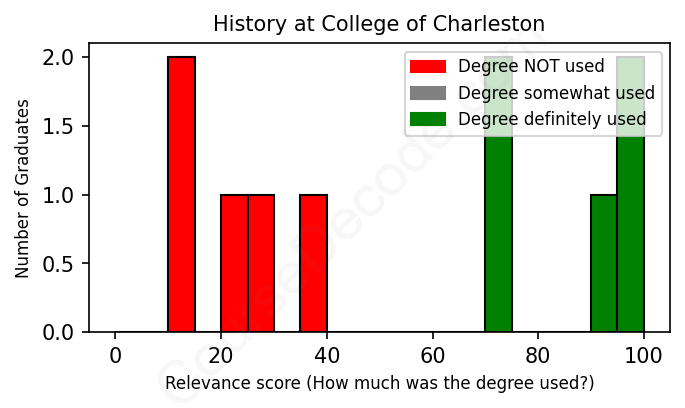
First, some facts. Of the History graduates from College of Charleston we've analyzed , here's how many have used (or NOT used) their degree in their career:

These are estimates based on AI analysis of 10 LinkedIn profiles (see below).
The verdict? Significantly below average. Overall, with an average relevance score of 54%, History graduates from College of Charleston have a much lower likelihood (-13%) of finding work in this field compared to the average graduate across all fields:
And for comparison, here's the chart for all profiles we've looked at across all degrees.
Also, after graduating, 50% of these graduates have pursued further education other than another Bachelor's degree (such as a Masters degree or other), compared to the average across all profiles of 35%. This suggests you may need more than just a Bachelors degree to be competitive as a History graduate.
See the details:
|
Relevance score: 11% We think this person has NOT gone into a career related to their degree. We think this person has NOT gone into a career related to their degree.
DEGREE INFOGraduated in 2017 from College of Charleston with a Bachelor of Arts - BA in History. Also pursued further education since (see below). JOB HISTORY SINCE GRADUATIONPhysician Assistant Fellow Medical University of South Carolina Oct 2020 - Sep 2021 Physician Assistant  Urgent Care Group Sep 2021 - Present FURTHER DEGREES DONE SINCE GRADUATINGMaster's degreeMedical University of South Carolina 2018 - 2020 ABOUTSkilled Physician Assistant with a history of experience in healthcare provider role and in retail pharmacy role. Certified in Basic Life Support (BLS) and Advanced Cardiac Life Support (ACLS). Experienced in Emergency Medicine and Telemedicine with a passion for expanding medical and interpersonal skills. |
The top 10 most common jobs done by the graduates we've analyzed (ranked most common to least) are:
Here is a visual representation of the most common words in job titles for History graduates (this is across all History graduates we've analyzed, not just those who went to College of Charleston):

Graduates from the College of Charleston with a degree in History seem to follow a variety of career paths after leaving school, reflecting a mix of traditional and non-traditional roles. For many of them, the first job out of college often involves teaching or educational roles, especially within a few years, with several starting as public educators, adjunct instructors, or social studies teachers. Others venture into the legal field, working as law clerks or legal researchers which can be quite common for History majors who wish to pursue law. There’s also a notable trend of some graduates moving into roles related to communications or corporate management, which shows that a History degree can open doors beyond the typical expectations.
Fast forward five or ten years, and many of these graduates have carved out impressive careers, particularly within education and legal services. Those who started teaching often find themselves progressing into higher roles in academia, like department heads or even deans, while others have made significant strides in the legal field, holding positions such as assistant public defenders or assistant attorneys general. However, it's also important to point out that not all graduates have remained in fields directly relevant to History, with some veering off into corporate roles or other unrelated jobs that might not fully utilize their History degree. Overall, while some have successfully built careers that connect closely with their academic background, others have taken their skills in different directions, showing the degree's versatility, even if those paths aren’t always what you might expect when studying History.
Getting a Bachelor’s degree in History at the College of Charleston, or really at most places, can be pretty manageable if you've got a passion for the subject. It usually involves reading a lot of texts, writing essays, and participating in discussions, which means you’ll need to be organized and willing to put in the effort. Some classes can be pretty intense, especially if you're diving into specific historical events or periods, but if you enjoy learning about the past and engaging with different perspectives, it might feel easier than other degrees. Overall, it's not considered one of the hardest degrees out there, but like anything in college, it will challenge you in its own way, especially when it comes to time management and critical thinking.
Most commonly, in the LinkedIn profiles we've looked at, it takes people 5 years to finish a Bachelor degree in History.
From what I'm seeing, it looks like these folks from the College of Charleston are on pretty varied financial paths after graduation. The ones in education, like the history instructors and social studies teachers, likely aren't raking in the big bucks, especially early in their careers, but they seem to find stable positions over time. Meanwhile, those who went the legal route appear to be climbing a bit quicker on the earnings scale, particularly the assistant public defender and assistant attorney general, which usually come with better paychecks. The people in corporate roles, like at Greystar, seem to be moving into higher-paying positions, which is a good sign for their financial future. Overall, while not everyone is making six figures right out of the gate, several are positioning themselves for decent salaries as they progress in their careers.
Here is a visual representation of the most common words seen in the "about" section of LinkedIn profiles who have a Bachelor degree in History (this is across all History graduates we've analyzed, not just those who went to College of Charleston). This may or may not be useful:

Here are all colleges offering a Bachelor degree in History (ordered by the average relevance score of their History graduates, best to worst) where we have analyzed at least 10 of their graduates: